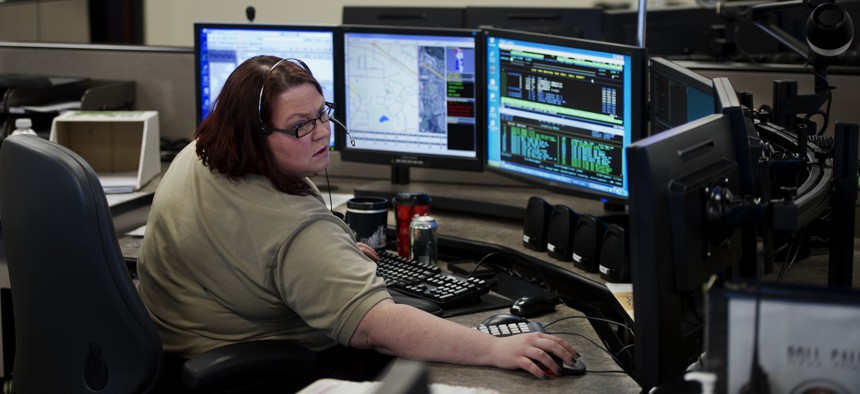Connecting state and local government leaders
Staff shortages are forcing emergency call center workers to pick up more overtime, work longer hours, adding extra pressure to an already stressful job, a new survey found.
It’s said that people dial 911 on the worst day of their lives. Anxious and frightened callers report heart attacks, car accidents, fires and mental health crises to 911 call centers. Dispatchers there must quickly and calmly ascertain the nature and location of the emergency and get the appropriate kind of help sent as soon as possible. It’s a high-stress job, where effective communication, experience and a cool head can literally mean the difference between life and death.
But it’s hard to remain level-headed when you’re working 12-16 hours per day and having to choose between responding to a police officer in the field, taking a 911 call or using the restroom because you are one of only a handful of dispatchers on staff. That’s the situation that many emergency call center workers are finding themselves in, according to a new survey of the 911 industry.
Now in its second year, the survey conducted by the National Emergency Number Association and Carbyne, an emergency call management services supplier, found that staffing shortages and technology gaps are taking a toll on emergency call center staff. Respondents ranked vacant positions as the first or second biggest challenge, with more than 82% of respondents reporting that their call centers struggle with staffing shortages. That’s a slight reduction from 88% last year.
Larger call centers, the survey found, are particularly hard hit by staffing issues. For instance, more than 55% of call centers struggle with chronic absenteeism, which increases to 77% for large centers. Insufficient staff leads to voluntary or mandatory overtime, shift work, long hours and extra stress, which in turn, leads to more staff calling out of work.
Dispatchers are also handling a greater volume of calls, and not all are emergencies. Misdials or pocket dials are on the rise, as are nonemergency 311 calls, which call centers are responsible for redirecting to the appropriate department. Survey respondents reported that between 60% and 75% of their total volume comes from administrative calls. The high volume of nonemergency calls was ranked as the first or second biggest technology issue dispatchers face.
“Our centers have been used for everything for the last 60 years—all the calls coming into the police and fire departments, animal protection, they threw at 911 centers, and we have to reroute those calls to where they are supposed to be,” Scott Brillman, director of Fairfax County, Virginia’s Department of Public Safety Communications, said in the survey.
The escalating workload amid staff shortages and low pay is creating a negative workplace culture, which 29% of emergency call center workers reported as one of the top three issues they face.
Even with those challenges, an overwhelming 87% of respondents said they “love” or “like” their jobs, despite the stress. Women, who make up 70% of the communications center workforce though, reported particularly high levels of stress, with 34% of women versus only 26% of men saying they feel stressed by the job.
Other workforce challenges include replacing older, more experienced call takers who are retiring or leaving. Budgetary issues are hampering these efforts. About 75% of emergency call centers lack the funds to augment their workforce, and even those with a budget still struggle with recruitment and retention. The difficulty of bringing on more staff is compounded because half of trainees do not advance beyond the probation period.
“There is an undeniable strain on the people who are the first first responders in public safety, the human voice on the line in a time of crisis,” said Brian Fontes, CEO of the National Emergency Number Association, in a statement. “Severe staffing challenges are continuing in 911, from difficulties in hiring new personnel to problems with employee retention and a mature workforce that shows signs of stress and burnout.”
Technology gaps were also cited by respondents. Just 24% reported that their call centers were capable of receiving images from a caller. That means people calling 911 in an emergency often have access to more advanced technology than dispatchers, which in turn means that dispatchers can’t receive a caller’s exact location or an image or video that would provide an accurate picture of what is happening. Fewer than 27% of centers can communicate with callers over text messaging apps, the survey found.
There are some bright spots in the survey.
To help staff manage the stress of the job, more than 95% of employers provide some form of mental health support, up from 90% in 2023, and 44% of employees take advantage of mental health services, up from 34% last year.
This year, while accurate caller location was still ranked the first or second technology challenge, 72.5% say they have access to geolocation services—a big improvement over last year when less than half of respondents reported that capability.
More than half, or 64%, of respondents said they think technology can help take some of the strain off emergency call center workers. While the majority do not think artificial intelligence can replace humans for emergency calls, respondents indicated there may be a place for automation that helps answer nonemergency calls as well as technology that would allow remote work for managing administrative calls.
What’s more, as emergency call centers’ technology infrastructure matures, it is helping dispatchers build a more complete picture of an incident as they communicate with responders and keep everyone on the same page. Besides pulling in research on the subjects involved in the call, “we are incorporating video, audio, location, multimedia,” said Michael Brewer, deputy director at the Jefferson County, Colorado, Communications Center. Call center staff can then “provide that information back and forth [to field responders]. It's creating a more complete storyline of the individual, and that’s only coming through the usage of technology.”

NEXT STORY: What cities can learn from Seattle’s racial and social justice law




